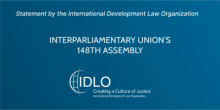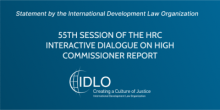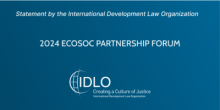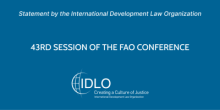Interparliamentary Union’s 148th Assembly
Statement by International Development Law Organization (IDLO), delivered by Mark Cassayre, Permanent Observer of the International Development Law Organization to the United Nations in Geneva


The transformation of food systems can play an essential role in achieving Sustainable Development Goal 2 on zero hunger, and ensuring that all people have adequate access to food and nutrition.
IDLO supports this through a rule-based transformation of food systems that is equitable, just and sustainable, and in line with international human rights principles and instruments. We embrace the rule of law as a catalyst for this transformation firmly embedding it in IDLO’s Strategic Plan 2021-2024, and focusing our work on three core elements:
A thematic area focused on the rule of law for food security also provides opportunities for strengthened collaboration with UN agencies focused on food and agriculture.
Read more about IDLO’s work on the rule of law for food security:
Statement by International Development Law Organization (IDLO), delivered by Mark Cassayre, Permanent Observer of the International Development Law Organization to the United Nations in Geneva

Statement by International Development Law Organization (IDLO)

Statement by International Development Law Organization (IDLO), delivered by Henk-Jan Brinkman, Permanent Observer of the International Development Law Organization to the United Nations





Statement by International Development Law Organization (IDLO), delivered by IDLO Director of Programmes, Franco Sanchez-Hidalgo




|
Policy Statements
|
|
Policy Statements
|
|
Policy Statements
|